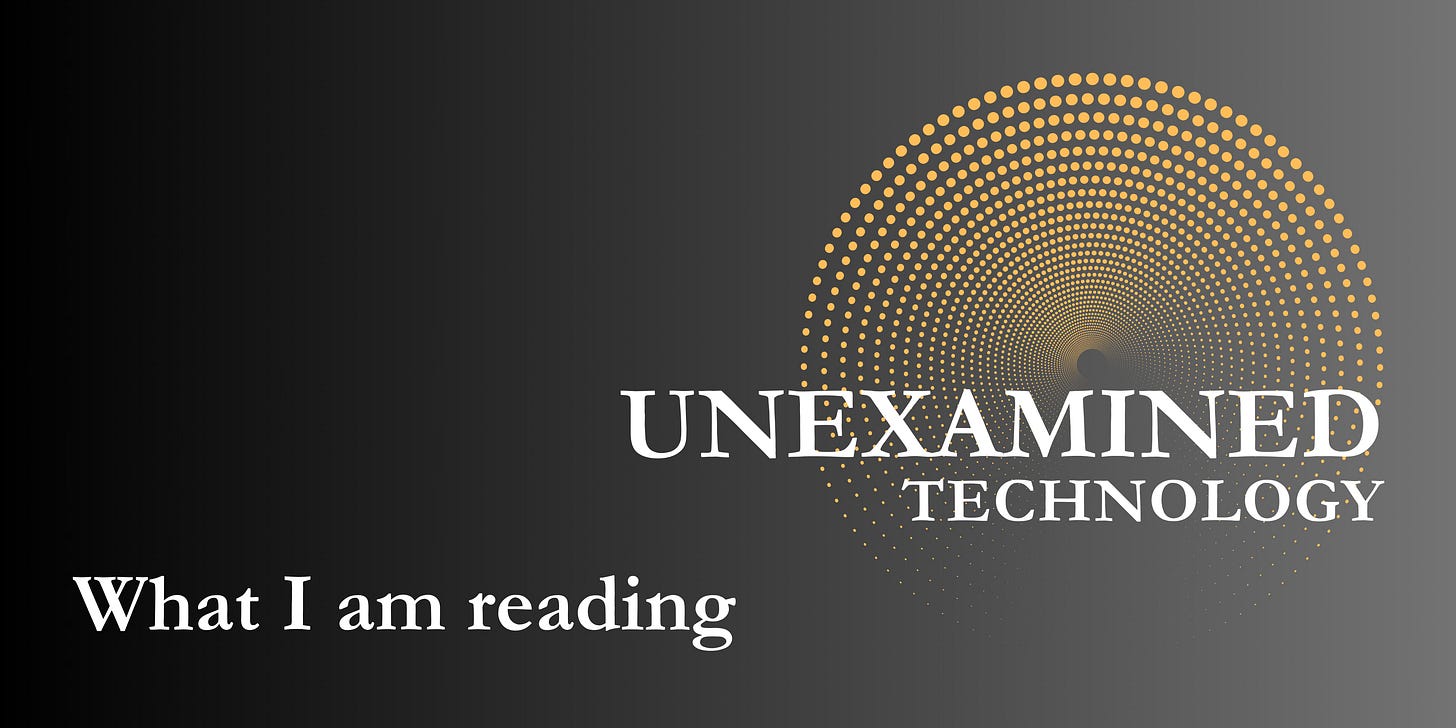In the Monday edition of the newsletter I am sharing observations about books or articles I am currently reading or have recently finished. The Friday posts are the longer essays inspired by the literature and other sources.
I am excellent at starting books, less good at finishing them — another book always begs starting! But I am also wary of quoting out of context, i.e. I hold it important to try to understand a book or an article in the broader body of work by the author (which takes time and effort!)
When possible, I will add the books to the Unexamined Technology page at bookshop.org] with an affiliate link, i.e. purchasing them that way helps me a little. That’s for full disclosure. (The occasional Amazon link, when a book is not available elsewhere, is not affiliate.)
Pick’s for Monday, 26th of February 2024
Examined book of the week
Adrian Daub, What tech calls thinking. An Inquiry into the Intellectual Bedrock of Silicon Valley.
Daub, a literature professor in the Bay Area, provides a book-length analysis of the discourse Silicon Valley tech entrepreneurs and venture capitalists use in romanticising the tech scene. The (short) book from 2020 loses some steam towards the end, but Daub still packs several quotable insights into its 150 or so pages.
He picks out examples that range from the glories of dropping out of college — in which cases the higher education experience was not transactional enough — to the disruptions that do not really disrupt anything. In the introduction, Daub puts forward his thesis about how the discourse conveniently downplays any past developments to its ends:
The rhetoric of Silicon Valley may seem unprecedented, but in truth it is steeped in some pretty longstanding American traditions - from the tent revival to the infomercial, from predestination to self-help. Again and again we'll come across two phenomena that to the untrained eye look identical, but a whole propaganda industry exists to tell us they are not. … Taxi company loses money; Uber loses money - apparently not the same. The tech industry ideas portrayed in this book are not wrong, but they allow the rich and powerful to make distinctions without difference, and elide differences that are politically important to recognize. They aren't dangerous ideas in themselves. Their danger lies in the fact that they will probably lead to bad thinking. -p.7.
In the chapter titled Communication, Daub identifies the underlying idea behind the tech entrepreneur-created social media platforms: communication as an absolute value, rather than what is communicated and with what rhetoric — anything goes, leading to the volatility of the messaging and the lack of accountability to monitor the communication. I enjoyed Daub’s observation of ‘the reply guy’, “someone who replies to a tweet or a Facebook post that seemed to require no reply, and who then invariably expresses disappointment when the original poster tells him so.”
Towards the end, Daub talks about ‘weak utopianism’, which is the Silicon Valley flavour of utopianism. It is weak because it wants to steer clear of any political implications. As long as the utopia is about an app that gets you a burrito delivered under thirty minutes, it is a utopia Silicon Valley is comfortable with. Anything more utopian about human flourishing, equity of income, etc., is out of the comfort zone.
Examined article of the week
I cited Jonnie Penn’s “Algorithmic Silence: A Call to Decomputerize” in the post about critical technical awakenings, and I feel it is worth picking up here. He introduces the concept of ‘algorithmic silence’ as a principle according to which the power of digital decision systems, such as facial recognition systems, should be renegotiated in favour of human decision-making.
In the article, Penn explores the banalities of the ‘AI revolution’ we are witnessing. He discusses ghost work, technical debt, intellectual debt, critique of autonomous systems, and participatory labor as forms of ‘delayed labor’ that actually increase rote tasks, for example, despite the claims for the omnipresent automation through AI. The five forms of delayed labor represent aspects “that organizations depend upon to further the sales friendly mythos of AI”.
Enter algorithmic silence. If unburdened by the accumulated labor required to perform the AI Revolution ad infinitum, citizens would gain the incremental derivative economic or administrative relief needed to decide on a civic future for themselves. Their reliance on technocrats posturing as AI ethicists would be diminished in proportion to the nonproliferation of faux automation systems, since—in principle—the civic space in which they operate would be relatively less influenced by unrestricted impositions on their finite time. Algorithmic silence provides a content agnostic framework for solidarity across settings, be it restraint for workers, consumers, parents, prisoners, women, youth, etc.
Algorithmic silence privileges rest and community-based decision-making over blind beliefs about AI and its consequences as progress in every conceivable way. Penn’s text is quite academic but an important call for resistance.
Examined Substack of the week
I found
’s The Absent-Minded Professor via another Substack, and immediately found his approach thought-provoking and collegial to my efforts here. As I see it, Josh likes to ask the essential ‘Why?’ in the face of technological developments that their creators like to put forward as inevitable and inherent progress.In that way, Josh Brake’s writings are similar in tone to Adrian Daub’s book (above). Josh’s suggestions about alternative paths are worth reading. I expect to restack his observations regularly. For example, his post about Apple Vision Pro and its promises is a useful contribution to the discussion about our future relationship to computing. The post echoes similar concerns that Jaron Lanier voiced in the New Yorker piece I recommended last week.
Thank you for reading — next post will follow on Friday.
With love and kindness,
Aki





